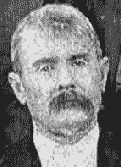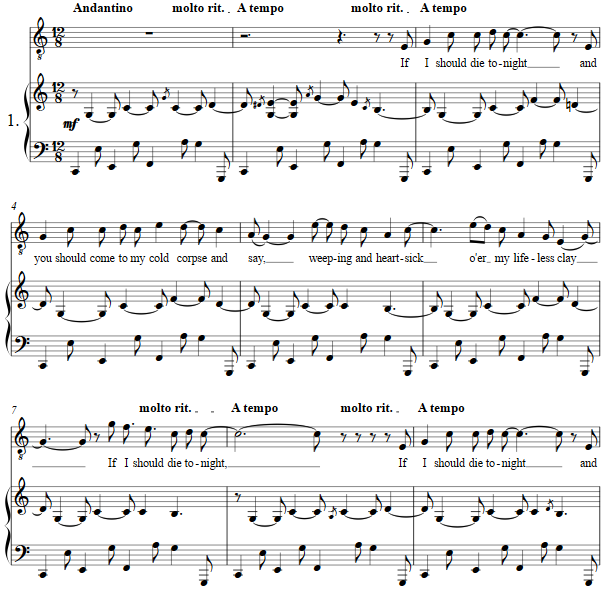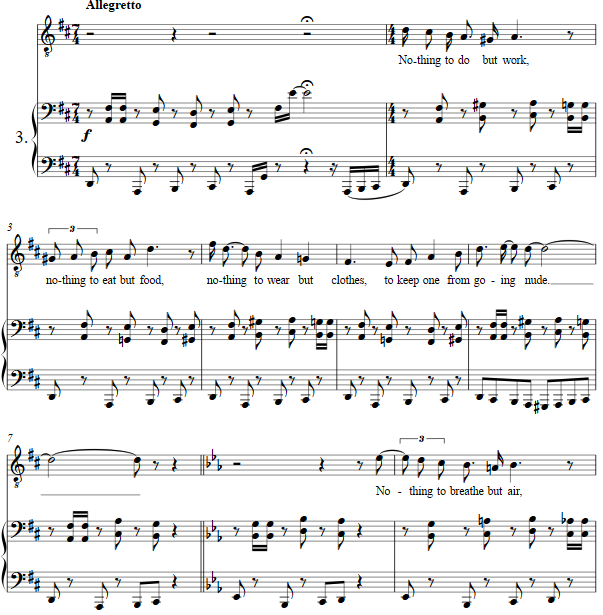Music and Texts of GARY BACHLUND Vocal Music | Piano | Organ | Chamber Music | Orchestral | Articles and Commentary | Poems and Stories | Miscellany | FAQs |
The Sum of Life - (2005)
Benjamin Franklin King
Three songs for tenor and piano
i. If I Should Die [ 3 pages, circa 2'30" ]
If I should die to-night
And you should come to my cold corpse and say,
Weeping and heartsick o'er my lifeless clay--
If I should die to-night,
And you should come in deepest grief and woe--
And say: "Here's that ten dollars that I owe,"
I might arise in my large white cravat
And say, "What's that?"
If I should die to-night
And you should come to my cold corpse and kneel,
Clasping my bier to show the grief you feel,
I say, if I should die to-night
And you should come to me, and there and then
Just even hint 'bout payin' me that ten,
I might arise the while,
But I'd drop dead again.ii. The Hair-Tonic Bottle [ 5 pages, circa 3'20" ]
How dear to my heart is the old village drugstore,
When tired and thirsty it comes to my view.
The wide-spreading sign that asks you to "Try it,"
Vim, Vaseline, Vermifuge, Hop Bitters, too.
The rusty old stove and the cuspidor by it,
That little back room. Oh! you've been there yourself,
And oft times have gone for the doctor's prescription,
But tackled the bottle that stood on the shelf.
The friendly old bottle,
The plain-labeled bottle,
The "Hair-Tonic" bottle that stood on the shelf.
How oft have I seized it with hands that were glowing,
And guzzled awhile ere I set off for home;
I owned the whole earth all that night, but next morning
My head felt as big as the Capitol's dome.
And then how I hurried away to receive it,
The druggist would smile o'er his poisonous pelf,
And laugh as he poured out his unlicensed bitters,
And filled up the bottle that stood on the shelf.
The unlicensed bottle,
The plain-labeled bottle,
That "Hair-Tonic" bottle that stood on the shelf.iii. The Pessimist [ 5 pages, circa 2'15" ]
Nothing to do but work,
Nothing to eat but food,
Nothing to wear but clothes
To keep one from going nude.
Nothing to breathe but air
Quick as a flash 't is gone;
Nowhere to fall but off,
Nowhere to stand but on.
Nothing to comb but hair,
Nowhere to sleep but in bed,
Nothing to weep but tears,
Nothing to bury but dead.
Nothing to sing but songs,
Ah, well, alas! alack!
Nowhere to go but out,
Nowhere to come but back.
Nothing to see but sights,
Nothing to quench but thirst,
Nothing to have but what we've got;
Thus thro' life we are cursed.
Nothing to strike but a gait;
Everything moves that goes.
Nothing at all but common sense
Can ever withstand these woes.Total cycle [ 12 pages, circa 6'05" ]
Benjamin Franklin King
These tongue-in-cheek poems laugh at us, with our foibles in which we repay our debts too slowly or infrequently, as one sees in the humorous "If I Should Die Tonight."
The "Hair-Tonic Bottle" held something other than hair tonic, in the times of avid temperance movements and then the failed prohibition against alcohol which followed in our halting American saga, and this recollection of having such a "tonic" available to the alcoholic is meant to be a fond memory. Therefore the setting is lyrical and old-fashioned, even romantic, to highlight the quixotic humor of this distinctively American poet.
Folks will find something to complain about, even in times of prosperity, health and advancement, as King reminds us in this -- another lesson in the "sum of life." "Corny" modulations up by half steps for each strophe merely underscore the sense of futile complaint which this miserable one makes against all the good and sustaining things of life.
The "sum of life" for one so cursed is the misery, which he has set out to find, has found and then continues to wallow in in an almost celebratory manned. As Ben King died in 1894, one might suggest his prescience as he foresaw the modern "ennui" which the meager craft of psychology and self-help trends celebrate, not to mention the self-proclaimed miseries embedded in the credo of modern politics. One only look to political demonstrations in Europe and America in which freedom is accused of the misery which the lack of freedom always delivers.
Another of my cycles based on the poems of Benjamin Franklin King is titled, Injun Summah; while "The Sum of Life" emphasizes the humor and wit of King, the other, written for mezzo soprano Jane Bunnell, paints a musical picture of Americana as described by the talented Ben King. At that page, additional biographical information on him may be reviewed as well.



